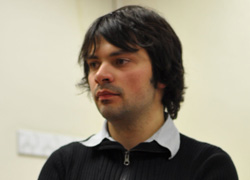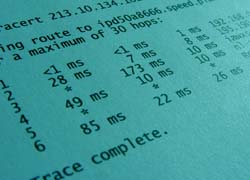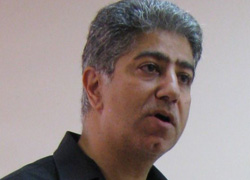IMDEA Networks

Event Category: In-house Presentation
Optimization in optical networks
In the talk I overview some recent results for optimization problems that originate in optical networks. They deal with optimizing the utilization of regenerators (switching components that regenerate a signal after a certain distance) and ADMs (Add-Drop Multiplexers).
Read more arrow_right_altTREND Project Plenary Meeting & Open Day
On Sep 26th and 27th we organize a meeting of the EU project TREND. The research conducted in this project is in the field of energy efficient networking. The second day of the project is dedicated to several research talks by members of the project as well as some external speakers. Those interested in attending to these sessions are welcome to do so. The only requirement is to complete the registration form by Thursday, September 22nd
Read more arrow_right_altSeminar: Peer-to-peer vs. IP multicast: comparing approaches to IPTV streaming based on TV channel popularity
Already a popular application in the Internet, IPTV is becoming, among the service providers, a preferred alternative to conventional Broadcasting technologies. Since many of the existing deployments have been done within the safe harbor of telcos own networks, IP multicast has been the desired streaming solution. However, previous studies showed that the popularity of the TV channels follows the Pareto principle, with the bulk of TV channels being watched only by a small fraction of viewers. Recognizing the potential scalability issues, we believe that multicast streaming approach may not be desirable for unpopular TV channels, especially when there are many such channels in the provider's service package.
Read more arrow_right_altNetworking and Meaning of Life First IMDEA Networks Workshop on Far-Out Ideas
The first Workshop on "far out" research ideas of the institute is to be held on December 17th, 2010. The purpose of the first edition of this series of workshops is to have researchers from the institute present very innovative ideas that could lead to internal projects or even the offspring of a full line of research. The sessions encourage brain-storming around the ideas presented, in order to help give them shape and evaluate their potential.
Read more arrow_right_altIncentives for Prefix Deaggregation in the Internet
The scalability issues the global routing system has been experienc- ing over the past years have raised serious concerns in the Internet community. One of the main culprits for the rapidly growing BGP routing table is the defragmentation process of the address blocks allocated to ASes, also known as prefix deaggreation. The Internet is a complex system and understanding its behavioural evolution is certainly a challenging task. For this reason, the use of eco- nomic models can provide intuitive explanations of the complex interactions between networks that result in the aforementioned phenomenon of prefix deaggreation. In this paper, we propose a game theoretic model to analyze the incentives behind the deag- gregating strategies of the networks. Announcing more-specific prefixes in the Internet impacts the size of the global routing table and increases the network operators’ capital expenditure for rout- ing equipment capable of sustaining the growing Internet. How- ever, we prove that the ASes are driven by fundamental economic reasons towards this type of apparently harming behaviour. We find that by announcing more prefixes the originating network achieves a more predictable traffic pattern and reduces the peak levels of bandwidth consumption. We show that this happens because, both in the equilibrium point and the social welfare point, the cost re- duction achieved by smoothing the traffic distribution outweighs the additional cost incurred by the routing table expansion.
Read more arrow_right_altNetworking and Meaning of Life: Second IMDEA Networks Workshop on Far-Out Ideas
The second Workshop on "far out" research ideas of the institute is to be held on January 19th, 2011. The purpose of the second edition of this series of workshops is to have researchers from the institute present very innovative ideas that could lead to internal projects or even the offspring of a full line of research. The sessions encourage brain-storming around the ideas presented, in order to help give them shape and evaluate their potential.
Read more arrow_right_altTowards a Collision-Free WLAN: Dynamic Parameter Adjustment in CSMA/E2CA
Carrier Sense Multiple Access with Enhanced Collision Avoidance (CSMA/ECA) is a distributed MAC protocol that allows collision-free access to the medium in WLAN. The only difference between CSMA/ECA and the well-known CSMA/CA is that the former uses a deterministic backoff after successful transmissions. Collision-free operation is reached after a transient state during which some collisions may occur. This article shows that the duration of the transient state can be shortened by appropriately setting the contention parameters. Standard absorbing Markov Chain theory is used to describe the behaviour of the system in the transient state and to predict the expected number of slots to reach the collision-free operation.
Read more arrow_right_altFrom Science to Business
The seminar will cover essential aspects of tech-based entrepreneurship, with special regard to ventures in the field of ICTs.
Resources for entrepreneurs at UC3M within the Campus del Emprendedor UC3M Programme will be detailed. An inspiring speech by young entrepreneurs from our Business Incubator will stimulate a discussion with attendees.
Read more arrow_right_alt
Networking and Network Security: Where I am, Where I am going?
In this talk I will briefly overview the research topics I have been working on, as well as describe new topics I recently began looking into. The former includes behavior-based Internet worm detection, Internet routing forensics, IP spoofing prevention, and trusted and incentivized peer-to-peer data sharing between distrusted and selfish clients. The latter includes reliable IP prefix monitoring, active phishing disruption, social networks for access control, security and privacy for homecare rehabilitation environments, and the clean-slate architecture design for future Internet.
The purpose of this talk is to provide a glimpse of my fights, so you can weigh which fights you would like to join me to win, or leverage my weapons to help win yours, or even better, we find and beat a common enemy.
Read more arrow_right_altDynamic Control Channel Assignment in Opportunistic Cognitive Radio Networks
Cognitive radio networks (CRNs) involve extensive exchange of control messages, which are used to coordinate critical network functions such as distributed spectrum sensing, medium access, and routing, to name a few. Typically, control messages are broadcasted on a pre-assigned common control channel (e.g., a separate frequency band, a given time slot, or a spreading sequence). Such a static channel allocation policy is contrary to the opportunistic access paradigm. In this work, we address the problem of dynamically assigning the control channel in CRNs according to spatiotemporally varying spectrum opportunities. We propose a cluster-based architecture that allocates different control channels to various clusters in the network. The clustering problem is formulated as a bipartite graph problem, for which we develop a class of algorithms that provide different tradeoffs between two conflicting factors: number of common channels in a cluster and the cluster size. Clusters are guaranteed to have a desirable number of common channels for control, which facilitates graceful channel migration when primary-radio activity is detected, without the need for frequent re-clustering. We use simulations to verify the agility of our algorithms in adapting to variations in spectrum availability.
Read more arrow_right_alt











Recent Comments